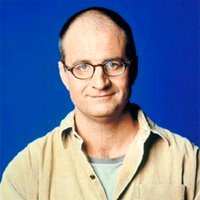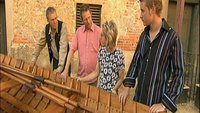 That’s it. The Weekend Australian has trashed one of my favourite shows on television, The Collectors, just one time too many now. I was prepared to overlook the first occasion because it was confined to the ‘Quick Bites’ section in the Review supplement, which is usually written by Kerrie Murphy. Generally, I like Murphy’s assessments. On the occasion of her summary of The Collectors, however, I think she got it wrong. She made a disparaging remark about the host, Andy Muirhead, suggesting he was patronising, a characterisation which surprised me. To me, Muirhead imparts an appropriate level of enthusiasm for the collectors and the artefacts he introduces.
That’s it. The Weekend Australian has trashed one of my favourite shows on television, The Collectors, just one time too many now. I was prepared to overlook the first occasion because it was confined to the ‘Quick Bites’ section in the Review supplement, which is usually written by Kerrie Murphy. Generally, I like Murphy’s assessments. On the occasion of her summary of The Collectors, however, I think she got it wrong. She made a disparaging remark about the host, Andy Muirhead, suggesting he was patronising, a characterisation which surprised me. To me, Muirhead imparts an appropriate level of enthusiasm for the collectors and the artefacts he introduces.The second trashing that The Collectors has received in The Weekend Australian, the one that I’m not prepared to overlook, is an article on page 40 of this week’s Review and is written by Mark Butler.
Butler begins by indulging in the favourite past time of The Australian’s journalists: ABC bashing. Surprisingly, for this conservative-friendly newspaper, he concedes that the problems he identifies with the public broadcaster are ‘government-decreed’. One of the issues that Butler has with the national broadcaster is its attempt to be representative of Australia by balancing the production of the major centres of Sydney and Melbourne with perspectives from the 6 other states and territories. While the programs which fill the 6.30pm week day timeslot—Talking Heads, Second Opinion, Beat the Chef, The Collectors and How the Quest was Won—hardly redress the imbalance towards the major centres, it is at least an acknowledgement that there are different viewpoints beyond ‘the harbour’, as it were.
Butler dismisses the ABC management’s regard for the ‘supposedly neglected outposts in Brisbane, Perth, Adelaide and Hobart’, suggesting that turning over production to these smaller ABC crews ‘ignores the sad truth that great cities tend to attract the brightest and best[*] in all fields, which means that provincial outposts are likely to be light on talent, much of which has fled to the big money and bright lights of cities such as Sydney’. The result, argues Butler, is that The Collectors and the other programs broadcast at 6.30pm are ‘tawdry, cheap and nasty’. Referring specifically to The Collectors, which hails from Hobart, he writes that if he didn’t know it was an ABC in-house production he would think that it was ‘whipped up by a bunch of high school students with a borrowed camera and a copy of TV Panel Shows for Dummies.’
 I’m not sure that anyone outside of Sydney was supposed to read this. (For two weeks now, the reader of the 7.00pm ABC News bulletin has been listed in the Review’s TV Guide as Juanita Phillips. I think that Queensland has mistakenly received the Sydney version—our man in Brisbane is Andrew Lofthouse.) It’s difficult to believe that any editor or proprietor wanting to maintain a national readership would sanction the wider distribution of such ill-informed parochialism. Yes, even Sydney can be parochial. Butler’s characterisation of cultural activity in centres outside of Sydney and Melbourne not only ignores a whole range of cultural practices but employs faulty logic about why cultural producers live where they do. His ‘sad truth’ ignores the opportunities that ‘provincial outposts’ offer for new forms of cultural practice to emerge, away from the shadows which are the values of the cultural establishment. Butler’s truth takes no account of the talent that chooses to stay in the backwater; he need only read Iain Shedden’s interview with Bernard Fanning (R4-R6), which appears several pages before his diatribe, to find that money is not the only motivation in a cultural practitioner’s life. Sometimes people are far less shallow than Butler supposes; they seek to maintain close family relationships and some sunshine in their lives. Further evidence that talent exists outside of Sydney and Melbourne is in the migration of film and television producers to less expensive and competitive cities from the artificial lights that Butler deifies.
I’m not sure that anyone outside of Sydney was supposed to read this. (For two weeks now, the reader of the 7.00pm ABC News bulletin has been listed in the Review’s TV Guide as Juanita Phillips. I think that Queensland has mistakenly received the Sydney version—our man in Brisbane is Andrew Lofthouse.) It’s difficult to believe that any editor or proprietor wanting to maintain a national readership would sanction the wider distribution of such ill-informed parochialism. Yes, even Sydney can be parochial. Butler’s characterisation of cultural activity in centres outside of Sydney and Melbourne not only ignores a whole range of cultural practices but employs faulty logic about why cultural producers live where they do. His ‘sad truth’ ignores the opportunities that ‘provincial outposts’ offer for new forms of cultural practice to emerge, away from the shadows which are the values of the cultural establishment. Butler’s truth takes no account of the talent that chooses to stay in the backwater; he need only read Iain Shedden’s interview with Bernard Fanning (R4-R6), which appears several pages before his diatribe, to find that money is not the only motivation in a cultural practitioner’s life. Sometimes people are far less shallow than Butler supposes; they seek to maintain close family relationships and some sunshine in their lives. Further evidence that talent exists outside of Sydney and Melbourne is in the migration of film and television producers to less expensive and competitive cities from the artificial lights that Butler deifies. Butler’s conflation of regionally produced television with an absence of quality and value is not only offensive, it’s insupportable. Butler laments that George Negus Tonight, was ‘unaccountably dumped’[†] from the ABC to make way for the regionally-based programs. Yet this Sydney-produced program had very similar, basic production values to The Collectors. (And I seem to recall that it was also identified by commentators at the time as a mark of the ‘eviscerated state’ of the ABC.) On GNT, George sat on a couch to chat with his daily guest and leaned against a desk in the studio ‘office’ to introduce reports 6 - 8 minutes in length from journalists in the field. I enjoyed this show for what it was; George was an affable host and he conducted some good human interest interviews. Butler lauds Negus’s program above The Collectors which he asserts is ‘cheap’, has amateur production values, and ‘takes the drearily familiar form of a panel show on to which is attached a lame game-show element’.
Butler’s conflation of regionally produced television with an absence of quality and value is not only offensive, it’s insupportable. Butler laments that George Negus Tonight, was ‘unaccountably dumped’[†] from the ABC to make way for the regionally-based programs. Yet this Sydney-produced program had very similar, basic production values to The Collectors. (And I seem to recall that it was also identified by commentators at the time as a mark of the ‘eviscerated state’ of the ABC.) On GNT, George sat on a couch to chat with his daily guest and leaned against a desk in the studio ‘office’ to introduce reports 6 - 8 minutes in length from journalists in the field. I enjoyed this show for what it was; George was an affable host and he conducted some good human interest interviews. Butler lauds Negus’s program above The Collectors which he asserts is ‘cheap’, has amateur production values, and ‘takes the drearily familiar form of a panel show on to which is attached a lame game-show element’. A program even closer to The Collectors in terms of its production values is The New Inventors; its set is almost identical. In both programs, the host sits at the end of a long desk, which, further down, seats a panel of three who are informed on the topic at hand, inventions or collectibles. The New Inventors first introduces the inventor and his or her invention in a 1-2 minute film before returning to the studio for further explanation from the inventor in a brief interview with the host, James O’Loghlin. O’Loghlin and the inventor then take a seat alongside the panel who proceed to further question the inventor and comment on various aspects of the invention, including design, originality and marketability. The format of The Collectors allows for some longer stories about looking for collectibles in every place from flea markets and estate sales to auction houses and from dealers. Other stories focus on a range of collections which are stored everywhere from museums to backyard sheds. In the case of the collections that are showcased, often the collector or someone associated with the collection is interviewed in the studio by Muirhead, while the panel discuss examples of the collection that have been placed in front of them.
A program even closer to The Collectors in terms of its production values is The New Inventors; its set is almost identical. In both programs, the host sits at the end of a long desk, which, further down, seats a panel of three who are informed on the topic at hand, inventions or collectibles. The New Inventors first introduces the inventor and his or her invention in a 1-2 minute film before returning to the studio for further explanation from the inventor in a brief interview with the host, James O’Loghlin. O’Loghlin and the inventor then take a seat alongside the panel who proceed to further question the inventor and comment on various aspects of the invention, including design, originality and marketability. The format of The Collectors allows for some longer stories about looking for collectibles in every place from flea markets and estate sales to auction houses and from dealers. Other stories focus on a range of collections which are stored everywhere from museums to backyard sheds. In the case of the collections that are showcased, often the collector or someone associated with the collection is interviewed in the studio by Muirhead, while the panel discuss examples of the collection that have been placed in front of them. Butler’s criticism of panellists on The Collectors is personal. He writes, ‘[Adrian] Franklin is a sociologist, so enough said’. Well, I’m not necessarily a fan of all sociological methodologies but it’s not enough cause to dismiss an entire body of scholarship or, in the case of Franklin, a life’s work. No one would say “Butler is a journalist, so enough said”, would they? The shallowness of Butler’s argument is further demonstrated in his comments about Gordon Brown. Apparently the only time Butler perked up while watching the review tape was when he heard Brown’s ‘soft Scots accent’. It is a sexy accent, and occasionally the audience is treated to an equally sexy vision of Brown in his kilt, but to suggest that a fact of birth is his only point of interest borders on bigotry and effectively dismisses Brown’s obvious expertise as an antiques dealer. It’s just churlish. Of course Butler has very little to say about the third panellist Lauren Carpenter; he is completely dismissive of her existence, never mind her knowledge of textiles.
Butler’s criticism of panellists on The Collectors is personal. He writes, ‘[Adrian] Franklin is a sociologist, so enough said’. Well, I’m not necessarily a fan of all sociological methodologies but it’s not enough cause to dismiss an entire body of scholarship or, in the case of Franklin, a life’s work. No one would say “Butler is a journalist, so enough said”, would they? The shallowness of Butler’s argument is further demonstrated in his comments about Gordon Brown. Apparently the only time Butler perked up while watching the review tape was when he heard Brown’s ‘soft Scots accent’. It is a sexy accent, and occasionally the audience is treated to an equally sexy vision of Brown in his kilt, but to suggest that a fact of birth is his only point of interest borders on bigotry and effectively dismisses Brown’s obvious expertise as an antiques dealer. It’s just churlish. Of course Butler has very little to say about the third panellist Lauren Carpenter; he is completely dismissive of her existence, never mind her knowledge of textiles. As I see it, Butler wishes he was watching another program. He compares Muirhead unfavourably to Wil Anderson from The Glass House: ‘Host Andy Muirhead evinces a bright affability and comes across as Wil Anderson without the acerbic edge, which is rather akin to drinking alcohol-free wine’. Here the question is begged, why does Muirhead have to be anything like a comedian-presenter of a satirical news program? It’s an unfair and illogical judgment. In another mystifying comparison, Butler holds up the British produced programs Antiques Roadshow and Bargain Hunt as superior in their entertainment value. I’m not familiar with Antiques Roadshow, but Butler’s description of Bargain Hunt reveals an entirely different premise; it is a game show with teams of contestants and The Collectors is not, even with the inclusion of segments where the panellists vie to identify a ‘mystery’ object from the collection at the Tasmanian Museum and offer the closest estimate for which an item will sell at auction. What Butler misses is that The Collectors is about collectors and what they collect, which is not always antiques and not always for monetary value. The Collectors is far more egalitarian in its focus; people can and do collect the plastic toys in cereal packets and it doesn’t mean they’re either ‘nutters’ or on drugs[‡]. It means that human beings are complex and varied creatures who collect for many reasons that are interesting. In the case of those who collect ephemera, such as throw-away toys, the motivation is about memories of childhood, for example. People who collect the artefacts of everyday life are not to be dismissed so scathingly; in the future their enthusiastically compiled collections will tell us more about our expansive society than the expensive furniture of the ruling classes (although it is always worthwhile knowing who wields power in any era). Even the collector who stored cheeseburgers in his garden shed, catalogued according to date of purchase[§], does not deserve the invective that Butler directs towards those who don’t concur with his Victorian informed notions of ‘culture’.
As I see it, Butler wishes he was watching another program. He compares Muirhead unfavourably to Wil Anderson from The Glass House: ‘Host Andy Muirhead evinces a bright affability and comes across as Wil Anderson without the acerbic edge, which is rather akin to drinking alcohol-free wine’. Here the question is begged, why does Muirhead have to be anything like a comedian-presenter of a satirical news program? It’s an unfair and illogical judgment. In another mystifying comparison, Butler holds up the British produced programs Antiques Roadshow and Bargain Hunt as superior in their entertainment value. I’m not familiar with Antiques Roadshow, but Butler’s description of Bargain Hunt reveals an entirely different premise; it is a game show with teams of contestants and The Collectors is not, even with the inclusion of segments where the panellists vie to identify a ‘mystery’ object from the collection at the Tasmanian Museum and offer the closest estimate for which an item will sell at auction. What Butler misses is that The Collectors is about collectors and what they collect, which is not always antiques and not always for monetary value. The Collectors is far more egalitarian in its focus; people can and do collect the plastic toys in cereal packets and it doesn’t mean they’re either ‘nutters’ or on drugs[‡]. It means that human beings are complex and varied creatures who collect for many reasons that are interesting. In the case of those who collect ephemera, such as throw-away toys, the motivation is about memories of childhood, for example. People who collect the artefacts of everyday life are not to be dismissed so scathingly; in the future their enthusiastically compiled collections will tell us more about our expansive society than the expensive furniture of the ruling classes (although it is always worthwhile knowing who wields power in any era). Even the collector who stored cheeseburgers in his garden shed, catalogued according to date of purchase[§], does not deserve the invective that Butler directs towards those who don’t concur with his Victorian informed notions of ‘culture’.It’s the laziness of Butler’s article that irritates me the most. Even if he does subscribe to Arnold’s view of ‘culture’, Butler’s effort falls far short of Arnold’s vision for the function of criticism. There is only so much in Butler’s ill-thought and prejudicial article that can be explained as a consequence of the production environment of newspapers, such as deadlines. I think it’s reasonable to expect more from a weekly supplement in a national broadsheet, even on the topic of a culturally devalued medium such as television. How long can newspaper managers and proprietors continue to accept that the reviewers of one of the most pervasive cultural forms in our society remain ignorant of critical methodologies which have been developed specifically for the medium? It isn’t appropriate to apply the work of Matthew Arnold to a popular cultural form like television when it was developed partly as a response to preserve elite culture and counter the rise of one of the first popular cultural forms, pulp fiction. Many writers at The Australian continue to employ outmoded binary oppositions which position popular culture and its consumers in the most negative light. To say nothing of their ongoing and wilfully ignorant use of ‘post-modern’ as a pejorative[**]. And to make such arguments, as Mark Butler does, using the hoary old chestnut of protecting the Australian taxpayer from the ‘embarrassment’ and ‘insult’ of apparently substandard forms, well, I’d rather swallow an old cheeseburger.
[*] When will these journalists throw out their copies of Matthew Arnold’s Essays On Criticism?
[†] Don’t feel too badly for George; he was very handsomely picked up by SBS.
[‡] I saw this episode at least a month ago. Do they show them in a different order in other states? Or did they pull this article out of the garbage since Murphy appears to be sick/ on holidays and therefore not at work to write an intelligent review for publication?
[§] There was no sign of mould on one dating from 1996! Truly a comment on contemporary food production.
[**] See Nick Leys’s article on Merrick and Rosso on page R38 of the same issue of Review
3 comments:
I haven't read this article or whatever, but man. You sure love collectors. And I agree. It's a good show. While I don't always agree with wardrobe choices for andy, it's a well done.
Heh. I just re-read this post after I received your comment. I do get on my high-horse a bit don't I? Funnily enough I was just getting all set to write something else about how much I like Collectors. I do love it.
Well said, all of this. For anyone with an interest in other people, Collectors is a top show, I love it.
-Robert.
Post a Comment